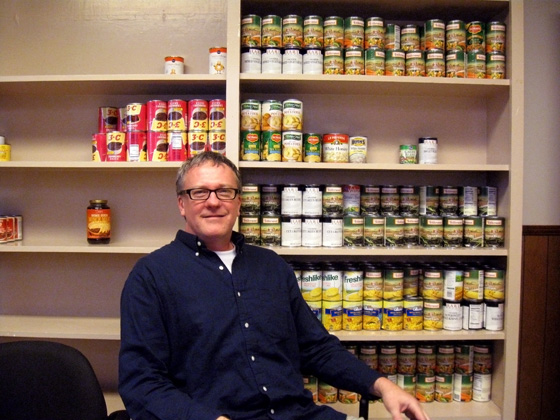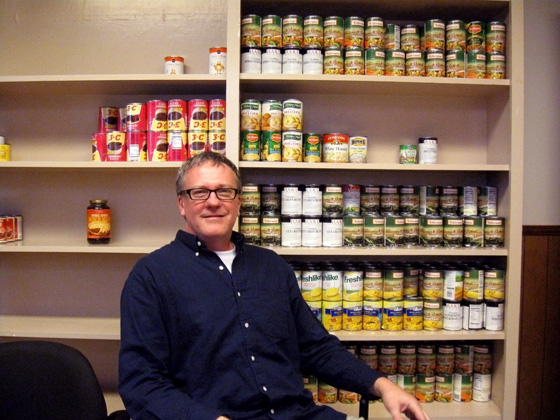
A new type of person has been requesting food at the Decatur Cooperative Ministry: professionals.
They include teachers, paralegals, even some of the nonprofit’s own former volunteers, says Cliff Richards, program manager of Project Take Charge, part of the Decatur organization.
“In the last year and a half, I’ve seen a real demographic shift,’’ Richards says. “I’m amazed at how many people who are well educated, people who I’d never think . . . [would] be in that position.’’
Georgia’s charitable food pantries, and the larger food banks that supply many of the pantries, have seen increased demand in the years since the economic slump began. Those in need of food range across the social spectrum, from families with small children to seniors on fixed incomes.
The state’s high unemployment rate and high poverty statistics – third in the nation – point to the hardships faced by a growing number of Georgia families. And joblessness, or simply underemployment, can translate into problems with nutrition and health, according to people who distribute food to the needy.
A recent U.S. Department of Agriculture report found that about 17 percent of Georgia households are “food insecure.’’ That means these families have had difficulty feeding all their members at some point during the year. Georgia’s food insecurity rate is well above the national average, an AJC article points out.
Richards estimates that his program receives more than 100 calls per week for food. Operating one of several pantries in DeKalb County, the Decatur Cooperative Ministry helps 50 to 60 families per month with emergency food aid.
Richards says he has noticed that many of the children accompanying the adults have health problems: respiratory ailments, diabetes, even obesity.
The obesity problem is not as paradoxical as it seems. It is partly rooted in food insecurity.
Urban health expert LeConte Dill, a fellow at the Satcher Health Leadership Institute at Atlanta’s Morehouse School of Medicine, says many poor neighborhoods are so-called ”food deserts.’’ They have an array of fast food restaurants but no full-service grocery stores.
And high-calorie food can be less expensive and more convenient. “For a single mom who is working, it’s easier and cheaper to stop at McDonald’s,’’ says Richards.
Dr. Harry Heiman, health policy director at the Satcher Institute, says that “people who have food insecurity tend to overeat more often when they have access [to food], and tend to eat more high-calorie foods.’’
The effect on children’s health can be profound, adds Heiman.
The Georgia Food Bank Association said in a Gainesville Times article that one in four Georgia children don’t know where their next meal is coming from.
“We know there’s a huge percentage of our children who are relying on meals that they get at school,’’ Kay Blackstock, director of Georgia Mountain Food Bank, told the Times. “We know hungry people equal sick people.’’ The food bank association is launching a No Kid Hungry campaign.
Research has shown that food insecurity in households is associated with many child health problems, including more stomachaches, frequent headaches and colds, iron deficiency anemia, behavioral and mental health problems, and chronic health conditions, a USDA report says.
Food insecurity “is a symptom of a much bigger problem,’’ Heiman says.
The food problem combines with the state’s high rates of poverty, unemployment, school dropouts and uninsured people to produce powerful negative effects on health, he says.
The anxiety and stress over where the next meal is coming from can compound physical health problems, Dill says.
Media from across the state have recently reported that supplies at some food banks and pantries have dropped while demand has risen. “We have seen a great shortage,’’ Maj. David Cope, who heads the Salvation Army of Central Georgia, told the Macon Telegraph.
Demand is up 15 percent to 20 percent over last year, says Ronald Raleigh of the Middle Georgia Community Food Bank.
Rome food banks are struggling to meet increased demand, according to the Rome News-Tribune.
A food pantry has opened on the University of Georgia campus, available for students and university staff members. The Athens Banner-Herald quoted a volunteer as saying that many students had to drop out of the meal plan this year due to financial strain.
Bill Bolling, executive director of the Atlanta Community Food Bank (ACFB), told Wsbtv.com recently that families’ food needs have escalated over the past three years. “We now have unprecedented numbers of children who are suffering because they don’t have enough to eat,’’ he said.
The ACFB says the amount of food it distributed rose 34 percent in the past year.
At many such agencies, protein-rich foods, fresh produce and other foods with high nutritional value are often in short supply. That can exacerbate the problems in the eating habits of many low-income households.
The safety net needs strengthening so people’s health doesn’t suffer from the general financial distress, Heiman says.
“If we’re not willing to invest as a state in creating communities where children and adults will thrive, the health outcomes will go only in one direction, and it’s negative.’’

